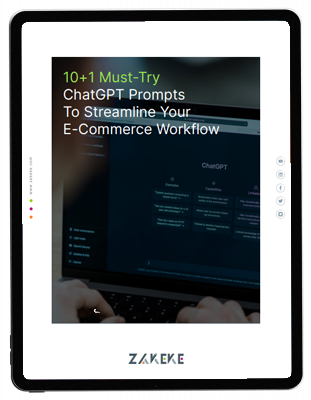There is no eCommerce without the digital medium. And there is no eCommerce marketing without a healthy helping of digital marketing. And that looks slightly different from if you implement the strategy for traditional businesses.
At this point, you may be wondering how that is.
Let us start this guide on digital marketing for eCommerce by answering that very question, before moving on to understand the whys and hows associated with the strategy.
How is Digital Marketing for eCommerce Different?
If you have dabbled in digital marketing campaigns at all, then implementing it for eCommerce companies may not look very different. But those small differences are absolutely critical, considering the nature of the industry and competition. Digital marketing for eCommerce entails activities that are tailored to bringing about growth, and boosting revenue of online stores.
If you open an online store even today, know that you are competing with the many eCommerce stores, and marketplaces that have already established a strong online presence. To overcome this competition, eCommerce companies have to carry out a combination of digital marketing activities tailored to their business.
Attracting to your website, retaining them, and getting business out of them is challenging for eCommerce websites considering the low switching costs, and high competition. For every product being sold out there by your online store, it is important to consider that there are several others that are doing the same. So there is little room for any kind of javascript errors or design mistakes to derail the performance of your eCommerce store.
Why is it Important?
Now that you know what digital marketing for eCommerce websites is, let us look at the many advantages that make this strategy so important for online stores:
- Boosts Customer Engagement: With the help of the right digital ecommerce marketing, you will be able to have enough content and features on your online store to engage your customers. Engaged customers tend to pay back with higher average order value.
- Improves Your Reach and Traffic: Your digital marketing prowess can help you maximize your organic reach and help you target more customers. You can then use these strategies to attract them to your website.
- Increase in Revenue and Profitability: By deploying a combination of email marketing and content marketing strategies, you can ensure that the visitors landing on your website go through their purchases. By consistently taking help of these efforts, you will be able to boost your revenue and profitability.
- Cost-Effectiveness: Apart from the initial investment you will need to set up your digital marketing strategy, it will cost your business very little to no money to continue those marketing activities. Even then, the total resources you will spend on implementing this strategy is far lesser than most of the other marketing strategies and can translate into steady returns.
Primary Digital Marketing Channels for eCommerce
Now that you understand the meaning of an eCommerce digital marketing strategy, and the benefits it can offer to your online store, it is time to get actionable. Here are some of the primary digital marketing channels you should consider when creating a digital marketing strategy for your eCommerce business:
- Search Engine Optimization (SEO)
Search Engine Optimization or as we know it, SEO, has a lot to offer to businesses of all kinds and sizes. Regardless of whether your business is a small dropshipping store finding its roots, or a large retail brand selling online, you can leverage SEO for promoting it and getting more customers.
Not only does SEO for ecommerce attract more visitors to your online store, it can also ensure that you maintain a good position on the SERPs, and elevate the shopping experience you deliver to your customers. By carrying out activities to improve your on-page SEO (actions on the website), and off-page SEO (actions external to the website), you can improve the technical performance along with the overall performance of your online store.
Here are some of the best practices you should consider when implementing your digital marketing strategy:
- Utilize all kinds of high-performing keywords related to your products and categories;
- Update your URL structure so that it is simple, semantically correct, and contains your targeted keyword(s);
- Invest into creating unique and optimized content, and avoid duplicate content on your pages;
- Elevate your user experience by having attractive web pages and user-friendly elements to guide your customers’ purchase journey;
- Strengthen your online reputation with the help of robust off-page SEO and ecommerce link building strategies.
2. Email Marketing
The second digital marketing strategy that you need to seriously consider for your eCommerce business is your email marketing strategy. Email marketing can help eCommerce businesses navigate different situations such as cart abandonment, promotion of products, and even attracting customers.
Not only can you leverage email marketing to reach and engage with your customers, but also to drive more sales and brand loyalty for your eCommerce businesses. You can tailor your email marketing campaigns to send promotional, transactional or even lifecycle-related messages, and ensure that your customers are engaged with your brand.
Building a strong email marketing campaign begins with having a professional email address to establish credibility. Having such an address not only enhances your professional image but also makes it easier for customers to recognize and trust your emails.
A few best practices that you can consider implementing within your email marketing campaigns include:
- The most important area that you should work on is enhancing the quality of your email list, as it will determine the impact of your email marketing campaign;
- Use compelling subject lines and content so that you can grab customers’ attention and avoid using language that may negatively impact your eCommerce brand;
- Leverage personalization to maximize the impact of the emails you send to your customers;
- If you are including a lot of media in your emails, ensure that they are all optimized to appear correctly on mobile devices;
- Use clear and effective call-to-action (CTA) elements that will encourage your subscribers to engage with your email and take action.
3. Social Media Marketing
Considering the entire world today is on social media, brands have no option but to leverage this channel for marketing. When done properly, social media marketing can cost your brand virtually nothing, and yet reward you with a lot of benefits such as more visitors, revenue, and better performance.
The biggest benefit of social media marketing, however, is that it lets you interact with your customers in real-time. The strategy also allows your customers to provide feedback, which can then help brands improve their products and shopping experience. You can also leverage social media to inform customers about any sales or discount offers, and even attract them to shop from your online store when you launch new products.
In order to take full advantage of you social media marketing strategy, consider following these best practices:
- Social media is a vast sea to fish from, so you can make your strategy work for you only if you have the right audience defined from the beginning;
- Work on coming up with a unique voice and personality tailored to your brand on your social media channel;
- Utilize the right combination of organic and paid strategies to get the most out of your social media presence;
- Showcase your customers’ reviews and testimonials on your social media profile to attract new ones;
- Monitor your social media performance and related metrics to tweak your profile for better performance and to generate useful insights about your target audience.
4. PPC Advertising
While the strategies that we have discussed so far are ones that can be implemented organically without the need for monetary resources, ecommerce advertising is one that requires you to set aside some budget. PPC advertising allows brands to advertise and promote their brand/product online while only paying when a potential customer actually clicks on the advertisement.
As an eCommerce brand, your online store will benefit a lot by including transactional keywords with commercial intent for various digital marketing activities. When utilized well, PPC advertising can help you increase awareness, reach new customers, and drive traffic among achieving other goals for your brand.
Most importantly, PPC advertising can help you level the playing field so that you can compete with competitors that are selling similar products and reach an audience that is difficult to engage with.
Here are some of the best practices that you can follow while implementing PPC advertising campaigns:
- Create powerful landing pages where you can redirect potential customers from your PPC ads;
- Ensure to come up with an effective ad copy that only builds context around valuable keywords but also sells your product/brand well;
- Ensure to manage your ad budget effectively by monitoring your expenses over time and drawing spending patterns;
- Analyze the PPC ads that your competitors are running and benefitting from, so that you can easily outcompete them;
- Be careful when targeting your PPC ad campaigns so that you do not end up wasting your ad budget on people who are not likely to engage with your brand.
5. Influencer Marketing
You must have seen a lot of well-known eCommerce brands seeking out brand advocates in people who are well respected and have the same target audience as the brand. Generally, influencers are social media or internet personalities with a lot of followers and enough engagement to actively promote your brand and products.
A good influencer marketing strategy will help you build more awareness and visibility for your brand, and even trust among your target audience. You will be able to grow your traffic and revenue easily through influencer marketing efforts. It is a powerful strategy if you use it right, and can help your brand truly grow in terms of revenue and customer base.
Here are some of the best practices that you should consider when you are implementing an influencer marketing strategy for your brand:
- Promote your influencer marketing campaigns through ads across platforms and mediums;
- Push your influencer marketing campaigns in your other strategies such as email marketing and social media marketing for best results;
- Build authentic and mutually beneficial relationships with influencers who can then help you elevate your brand personality;
- Do not remove or change influencers in the middle of a specific campaign as it can form a negative impression among your customers;
- Keep your budget for influencer marketing strict with a little bit of backup for the overhead costs that you could incur. When it comes to influencer marketing, spending can quickly get out of hand without a preset budget.
How to Create an Effective eCommerce Digital Marketing Strategy
So now you know what digital marketing for eCommerce is, and how you can effectively use different types of marketing channels to boost your strategy. Now let us look at the requirements for creating an effective digital marketing strategy.
Here are the primary steps you can follow in the process:
#1 Get to Know Your Audience
Implementing any marketing strategy will require you to start with understanding the audience that you are promoting your products and brand to. After all, this is the only way you will be able to figure out the right actions to engage them.
You will need to conduct quite a bit of market research to understand their preferences, the channels they frequent, and their online behavior before you can actively target them. Some of the basic demographics that you want to identify for your audience include age, gender, location, job, income, interests, marital status, buying behavior, and more.
#2 Set SMART Goals
Once you have your audience narrowed down, you want to start outlining your digital marketing strategy. The ideal place to start is by defining the goals that you want to achieve with the strategy. Ensure that these goals are SMART (Specific – Measurable – Achievable – Realistic – Time-bound) so that you can easily track and measure the outcomes of implementing the digital marketing strategy.
Once you have a broad goal to achieve for your business, you can start narrowing it down by getting really granular with the objectives. For instance, it is not enough for your goal to just be increasing your website traffic. Instead your goal should be something like “increasing website traffic by 20% in one year” so that you can track whether you have accomplished it.
#3 Build a Plan Based on Budget and Goals
Once you have already outlined the goals you want to achieve for your business, you would be able to build a plan targeted at achieving them. Another important factor that you should consider for your strategy besides your goals is your budget. There are a lot of avenues where you may end up unnecessarily spending a lot if you are not bound by a predefined budget.
#4 Choose Resources and Tools
As a part of implementing your digital marketing strategy, you will be utilizing a lot of resources and tools. Not only will you require personnel who have the necessary expertise to drive your digital marketing strategy forward, but also tools that will make it easier for you to implement those processes.
Picking the right tools to help your resources implement the digital marketing strategy is as important as choosing the channels and actions you want to utilize as a part of it.There are tools that will help you with strategizing your digital marketing actions to scheduling those actions on various channels.
#5 Implement Monitoring Mechanisms
The true sign of a successful strategy is not how well it is carried out but the extent to which it is able to successfully accomplish the goals that you set out to achieve with it. It is a good idea to utilize different kinds of metrics and mechanisms to monitor how your strategy is implemented. These metrics will also be able to let you know whether you have been able to achieve the goals, and the kind of changes you will need to make within the strategy.
Summing Up
For online businesses and eCommerce companies, having a strong digital marketing strategy is akin to having a definitive competitive advantage. Create a compelling strategy to ensure that your business is able to leverage all the digital marketing channels and actions available to grow your revenue and customer base.
Carl Torrence
Content Marketing Specialist
Carl Torrence is a Content Marketer at Marketing Digest. His core expertise lies in developing data-driven content for brands, SaaS businesses, and agencies. In his free time, he enjoys binge-watching time-travel movies and listening to Linkin Park and Coldplay albums.













